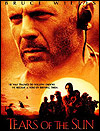| |

 A
21ST CENTURY RAMBO STOPS ETHNIC CLEANSING IN TEARS
OF THE SUN A
21ST CENTURY RAMBO STOPS ETHNIC CLEANSING IN TEARS
OF THE SUN
Tears
of the Sun, directed by Antoine Fuqua, is about
a rescue operation in Nigeria. A news broadcast begins the
film, reporting that a civil war has broken out, with the Moslem
North engaging in ethnic cleansing of the Christian South,
following the assassination of the democratically-elected president.
Four American missionaries at a medical facility are in jeopardy,
so Captain Bill Rhodes (played by Tom Skerritt) orders A. K.
Waters (played by Bruce Willis) to extract all four, an operation
that requires a squad of Navy Seals to be dropped near the
medical facility and subsequently picked up at a landing area.
When the Seals arrive to evacuate the missionaries, Dr. Lena
Kendricks (played by Monica Bellucci) refuses to go unless
the Nigerians hospitalized under her care go along, and the
other Americans insist on staying. After a helicopter picks
up Dr. Kendricks and the squad, the sight of those who are
being abandoned transforms Waters. He orders the return of
the helicopter, whereupon Dr. Kendricks, Waters, and the crew
disembark, reload with the weakest patients, and Waters is
prepared instead to lead Dr. Kendricks and fifty or so Nigerians
who are not in the best of health on foot to sanctuary in nearby
Cameroon. Waters persuades Rhodes that he is fulfilling the
goal of the mission, but through different means. The trek
through the jungle is difficult. At
one point they observe ethnic cleansing in a village, whereupon
the Seals proceed to kill the Nigerian cleansers to stop
the carnage.
|
That
a mere rescue operation has the firepower to fight a minor
battle may seems odd, but in time the
squad takes on an entire regiment that is closely tracking
the fleeing group because a traitor in the group is carrying
a tracking device. Dr. Kendricks foolishly had been withholding
information from Waters that one of the party seeking sanctuary
is the son of the deposed president; having killed the
president and all members of his family but the son, the
Nigerian rebels are intent on finishing the job at any
cost. There is no suspense about the ending, in which American
helicopters arrive to evacuate the president's son, Dr.
Kendricks, Waters, and what is left of the rescue squad.
Inexplicably, most of those who made the trek remain in
an unmanned refugee camp on the Cameroon side of the border.
Dr. Kendricks hugs wounded Waters in the end as a brave
soldier who has broken the rules to do his humanitarian
duty. But Willis's laconic Rambo role clearly out-shouts
the unspoken message that Washington should pay more attention
to ethnic cleansing in Africa. Of course, helicopter missions
could have evacuated all patients from the hospital earlier
in the film, so one question is why Rhodes blocked that
scenario. Although Dr. Kendricks refers to the more recent
civil war in Sierra Leone, where events are closer to the Tears
of the Sun script, director Fuqua chose Nigeria,
presumably because his crystal ball says that the 1967-1970
civil war in that country may reemerge to challenge the
government that was democratically elected in 1999 and
faces the voters again in April elections, after nearly
four years and 10,000 deaths due to a variety of causes.
The film ends with the familiar Edmund Burke quote, "The
only thing necessary for the triumph of evil is for good
men to do nothing." Yet the Frontline documentary The
Triumph of Evil (1999), about the Rwanda
genocide, makes that point far more convincingly. MH
|
|